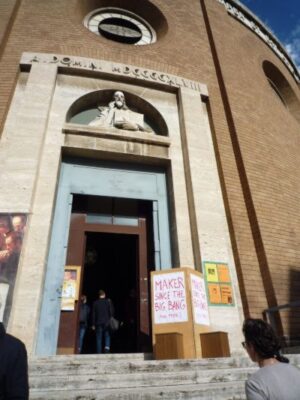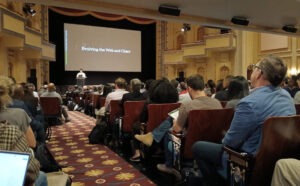Free software is everywhere, running the world’s biggest systems and your smallest screens, so why not throw a Jubilee in its honor?

Unless you were living under a rock all of last year, you should have heard that 2025 is a Catholic Jubilee year, that is a whole year of reconciliation, conversion, solidarity, hope, and justice.
The previous Jubilee in 2000 introduced separate, distinct Jubilees for groups including families, workers, and athletes. This time, the Vatican also ran, just before the Youth Jubilee that gathered almost a million people here in Rome, a two-day Jubilee of Digital Missionaries and Catholic Influencers, aiming to “celebrate, train, and inspire” those who evangelize through social media. In his address to the participants of this self-defined milestone for online evangelization, Pope Leo said, among other things (emphasis mine):
- “Today we find ourselves in a new culture, deeply characterized and formed by technology. It is up to us – it is up to each one of you – to ensure that this culture remains human.”
- “Science and technology influence the way we live in the world, even affecting how we understand ourselves and how we relate to God, how we relate to one another.
- “Go and mend the nets … [and weave] … networks that liberate and save.”
In his opening remarks at the digital-focused event, Paolo Ruffini, prefect of the Vatican Dicastery for Communication, also asked the influencers: “have we allowed ourselves to adopt the language of corporate marketing?”
What’s Missing Here Both From Influencers and the Vatican
Time will tell if that specific Jubilee event will be a milestone for online evangelization or not. Personally, I argue that to achieve that effect it should have shown and promoted much bigger awareness of a couple of issues.
Besides reading the official website and all the reports I could find so far, I have scrolled through the first four or five screens of the list of participants to the Digital Missionaries Jubilee. If their profiles are complete, they have two common characteristics: the obvious one is that they all know much, much better than me how to reach people through social media.
This is good because today’s social media is a cesspool where many people become addicted to bad habits. This has nothing to do with religion: to save sinners of whatever sort, you have to go where they spontaneously gather, not wait for them in an empty temple.
The bad thing is that — just like many other theoretically “professional” communicators — all those influencers seem to know only the cages they work in and nothing else, and seem happy with it.
If their self-descriptions are accurate, almost none of those influencers knows about the fediverse, the power of RSS, or the POSSE philosophy of publishing once on one’s own website, and then syndicate everywhere, including social media. They all seem blissfully unaware that it would take just one tiny change in the Terms of Use of the cages they’re in, and all their evangelization “will be lost in time, like tears in rain.”
Another thing I haven’t seen in this Jubilee is awareness and promotion of the fact that, even if everybody had his very own personal cloud, both the web and digital technology should be much more open than they are.
All those influencers spread online the “Do unto others as you would have them do to you” message. That’s good, but if they choose to do that only on big tech terms — ignoring the benefits of free and open source hardware, software, and protocols — they are just like farmers who increase their yields by planting patented GMO seeds they must purchase every year from some monopolist company, if that company lets them.
Put it another way, if a building was deliberately built with cheap pipes, electrical wiring, and toxic paint by some speculators, its tenants could still mitigate the consequences by helping each other. But they won’t really live a decent life until they demand that all buildings are built in a completely different way.
My Contribution
One exception to what I just wrote is Daniel Pocock, the controversial former Debian developer. On July 27th, the day before that Jubilee started, he asked if anybody had ever checked what the Bible has to say about hacking. Here’s what I wrote in reply (edited for clarity):
“…you ask if anybody had ever checked what the Bible has to say about hacking.
I did, starting in 2005. Please check out the reading list here, and also note my 2013 paper about Open Tech and Catholic Social Doctrine.”
Summing up, I have been saying for twenty years that open, free-as-in-freedom digital technologies are a perfect match for what Pope Leo and Ruffini just proposed to digital missionaries. To know why and how, check out my reading list or this other summary.
Please do it, because whatever you think of Catholicism or religion in general, I’m sure you will agree on one thing: really open technology, and respect for human rights in how technology is designed and managed — well before it’s used by ordinary people — are essential to make the world a better place.
Therefore, every person of good will can find their own reasons to do it — and to encourage others to do the same. What better moment than a Jubilee to explore, adopt, and promote free and open source software?

Marco Fioretti is an aspiring polymath and idealist without illusions based in Rome, Italy. Marco met Linux, Free as in Freedom Software, and the Web pre-1.0 back in the ’90s while working as an ASIC/FPGA designer in Italy, Sweden, and Silicon Valley. This led to tech writing, including but not limited to hundreds of Free/Open Source tutorials. Over time, this odd combination of experiences has made Marco think way too much about the intersection of tech, ethics, and common sense, turning him into an independent scholar of “Human/digital studies” who yearns for a world with less, but much better, much more open and much more sensible tech than we have today.






